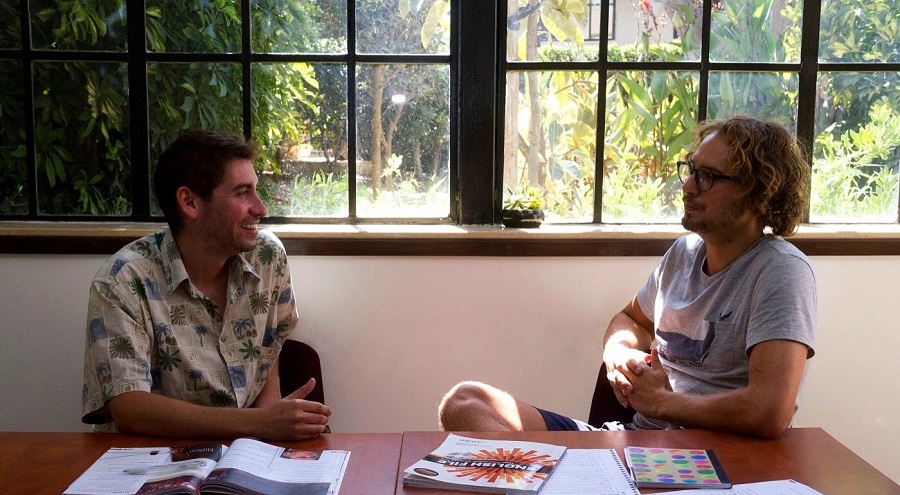Effective and Fun Activities for Adults to Learn English
Even as adults, games can be exciting and fun.
Learning English as an adult is not as difficult as you may believe. Many studies have found that adults have some benefits when it comes to language learning. Their maturity and life experience provide adults with many crucial approaches and capabilities that children just do not have.
The first step is to know it’s possible. The sooner you realise that it’s an achievable task, the more progress you will make.
And secondly? Making learning fun and memorable, by introducing some pleasurable tension and light competition. The best way to achieve this is to try fun activities aimed at adults as part of your English learning.
For instance, if we talk about learning vocabulary – simply reading and copying vocabulary on the blackboard gets boring relatively quickly. To give you a little more variety not only in vocabulary learning but in English learning in general, it can be helpful to play some games. Games are not only fun to play – especially with good friends – but also help you to improve your English. Today we would like to introduce you to some fun activities in English that you can play with your buddies.
Here are 5 fun activities for adults to learn English
1. Werewolf
Werewolves and villagers live in a fictional village. The villagers are in the majority and are afraid of the werewolves that might come at night and kill them. The game is divided into two phases: During the night, all players sleep and close their eyes, the wolves wake up and choose a victim by pointing their fingers, who should be dead the next morning. There are a few villagers with special roles, a seer, for example, or a blinking girl, who also wake up in the night and can spy a little for the village. The second phase is the next morning, when all players can wake up and discuss who might be a werewolf. One person is chosen to leave the game. If at some point all werewolves are dead, the village wins. But if at some point no villagers are left alive, the werewolves win.
The discussion about the possible werewolves and an exciting story around the events make the game lively and perfect for adults to learn English.
2. Two truths and a lie
You can play this game with as many people as you like. Take a piece of paper and a pen. Each person should write down three facts about themselves – two truths and a lie. Now you present your facts to the group and the group has to guess which fact is a lie. Extra questions may also be asked to see how well the person can lie. So be clever with your lie. The winner is the person who has sold the most lies to the group.
This game is a good way to practise question-answer dialogues and improve your vocabulary.
3. Scattergories
As a child, you often played Scattergories. And believe it or not: this game is even more fun in adulthood, because by now you have a much broader knowledge and can make the categories for this game exciting and complex. So take a pen and a piece of paper, create a table, fill it with categories and off you go. City, country, river, film, famous person or car brand – anything goes. Start with a letter and each person now looks for the matching terms for the individual categories. As soon as someone has finished, they call ‘Stop’ and 10 points are awarded for each correct answer. If the same answer appears more than once, only five points are awarded. The winner is the person with the most points at the end.
This game improves your vocabulary in different areas of daily life and is a lot of fun.
4. Scrabble
Maybe you already know this game and play it with words from your language in between. Now you can try it with English words. For the game you need the ready-made Scrabble pack or just lots of tiles with letters. One person starts and places a word with the tiles. The other players now have to create a word with their letters, i.e. the first letter of the word must be one of the letters of the first word. You can create words horizontally or vertically, or extend existing words, e.g. make a “baker” out of a “bake”. The person who is the first to run out of stones wins.
This game forces you to think about new words. If another person creates a new word, you might even get to know words that were previously unknown to you. And by the way, you also train your pronunciation.
5. Taboo
The game Taboo is probably known all over the world. You can buy a ready-made Taboo game, but you can also create the cards yourself. Basically, it’s about explaining a word to your team without using the words that go with it. The team that guesses the most words at the end is the winner. Here you will quickly learn how to paraphrase English words. This will be especially useful in future conversations.
Are you seeking other fun activities to learn English? Join our adult English courses in Malta and Gozo.
Learning English at our schools is different from anything you’ve ever experienced. Classes are communicative, and interactive and stimulate a real-world environment. You’ll learn practical language through activities, teamwork, and projects. At the same time, you’ll do so in an international community. The classroom really does come alive. And you’ll learn useful techniques to study on your own. With BELS, the whole world becomes your classroom.









